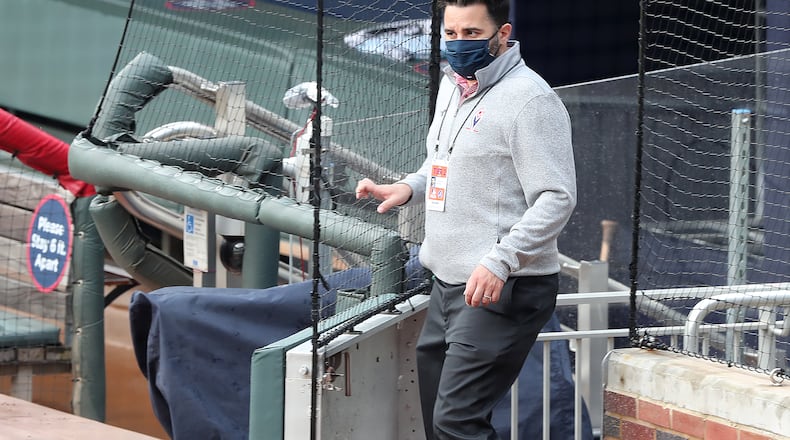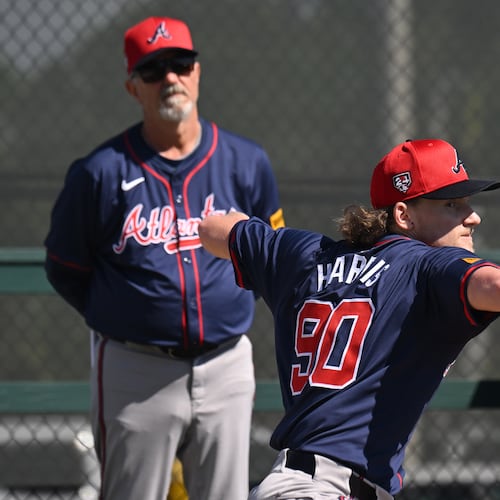Unlike last year, the Braves didn’t make a flurry of moves to address their glaring weakness at the trade deadline.
Despite a rotation in shambles, the Braves couldn’t line up on a deal, letting Monday’s 4 p.m. deadline pass without adding another starter. The Braves acquired lefty Tommy Milone from the Orioles on Sunday - their only move of the trading season.
“We would’ve loved to have added more, we had a lot of discussions, but we ultimately didn’t think there were deals that made sense for us,” said general manager Alex Anthopoulos. “There were a lot of players moved, but we had to decide how good are these players, how much are they an upgrade over what we currently have.”
It was not only a seller’s market, due to the expanded postseason that has most franchises in contention, but a weaker market for starting pitching; although it could be argued even a lesser rotation piece would be an upgrade for the Braves.
The only frontline starter traded was Mike Clevinger, who went from Cleveland to San Diego. The Braves were among the many teams heavily linked to Clevinger but were unwilling to top the Padres’ six-player package.
“Obviously a guy like Clevinger, an impact starter, clearly he was the best starter moved,” Anthopoulos said. “No doubt about it. With a lot of control (through 2022) and tremendous ability. That was a very strong deal for both sides. That was going to be a big deal, rightfully so. As far as a frontline, impact starter, he was the only one moved.”
Lance Lynn of the Rangers and Dylan Bundy of the Angels were two other starters reportedly drawing significant interest, but neither was moved. Both players are controllable through 2021.
Anthopoulos said the Braves’ inability to acquire a starter came down to the young players they were unwilling to give up. “The hang-up for us was not financial. It was talent,” he said.
With the thought of acquiring external help out the window, the Braves will turn back to internal hope.
That’s hoping Mike Foltynewicz can return better than before – he has been consistently throwing 94 mph at the alternate training site, Anthopoulos said. That’s hoping someone in the erratic trio of Sean Newcomb, Touki Toussaint and Kyle Wright can rediscover the strike zone.
That’s hoping the Milone they saw Sunday, who gave up seven runs without completing three innings, isn’t here to stay. That’s hoping Ian Anderson’s MLB debut was indicative of further success.
Also, there’s hope in Bryse Wilson, whose progress in Gwinnett has encouraged Anthopoulos, and lefty Tucker Davidson, who could make his MLB debut in the coming weeks.
“Those guys have gotten opportunities and they’re likely to get opportunities again,” Anthopoulos said of the pitchers at the alternate training site. “Now that they’re down, we just want to make sure they’re in a good place when we give them an opportunity to come back up here.”
Veteran southpaw Cole Hamels plays a factor, too. Hamels has been building towards a September return. Even then, there are a lot of “ifs” at play: If Hamels does return, and if he can even be average, it’d be a sizable upgrade.
The Braves would tell you crossing your fingers isn’t a strategy, but they’re now left with no other choice. They wanted a starter to step up across the first half of the 60-game season. Nobody besides Max Fried did. Now, they’ll play the same game over the regular season’s final 27 games leading into the postseason, for which the Braves are comfortably positioned despite their rotation.
“We’re a pretty good team and we’ve done a good job here for a month and a half,” said manager Brian Snitker, who added he was not disappointed with the team’s deadline. “We’ll continue to do whatever we can to try to win games. We’re going to do the best we can with the guys we have here.”
In the end, Anthopoulos made the calculated decision not to pay a higher price for lesser starters in this market. Since Anthopoulos arrived prior to the 2018 season – and really before that – there’s been never-ending conversation about the Braves cashing in their prospect stash for a proven commodity.
That’s exactly what the Padres did Monday. Somewhat a West Coast version of the 2018 Braves, the Padres are in the thick of the postseason race because their blue-chip talent is blossoming and their veterans are performing.
San Diego decided to switch out some of its minor-league quantity for major-league quality in the past two days, with Clevinger the most notable addition. The Braves haven’t been so bold in the past several seasons, instead working around the margins while making shrewd trades and shorter-term free-agent signings.
Anthopoulos will take criticism, which is fair. He determined the acquisition cost of whatever moves were available didn’t outweigh the benefit. He’ll be proven right or wrong in time, but it’s undoubtedly frustrated fans in the short term.
“I absolutely understand,” Anthopoulos said of fan disappointment. “I’m a sports fan. I can tell you we’ve had opportunities to move Austin Riley, Ozzie Albies, Ronald Acuna, Ian Anderson, Dansby Swanson and so on. But as we sit here today, we’re glad we held onto those players. The tough part of this exercise is you can’t just lay it all out and say here are all the deals, here are all the offers, alright everybody, you can opine whether you’d make this deal.
“You have to ultimately do what you believe is right. We’ll find out in the end if you made the right decision. That’s all I can really say.”
About the Author
Keep Reading
The Latest
Featured



